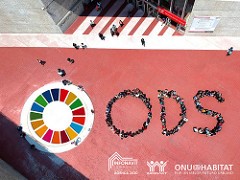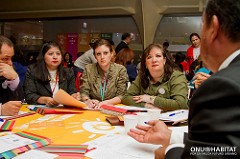Institutional framework based on the SDGs in the context of the project “Infonavit leading the implementation of the 2030 Agenda: housing at the center of SDGs”
Description
Project “Infonavit leading the implementation of the 2030 Agenda: Housing at the center of SDGs”, carried out between 2017 and 2018, aimed to position housing as a driver element for the fulfillment of SDGs and the 2030 Agenda in Mexico. It was structured in three components:<br />
1) Generation of evidence.<br />
2) Diagnosis and strategies for adequate housing.<br />
3) Institutional framework based on the SDGs.<br />
<br />
The objective of third component was to promote the Institute's leadership in the housing sector in achieving the 2030 Agenda for Sustainable Development based on promote key institutional changes in specific processes.
Infonavit, the largest social mortgage institution in Latin America has implemented, together with UN-Habitat, this project in order to position housing as a central element for the attendance of the SDGs in Mexico, as well as to reinforce Infonavit's leadership in the housing sector towards the fulfilment of 2030 Agenda.<br />
<br />
The purpose of this third component was to be a specific guide for aligning the Infonavit´s operation models to the 2030 Agenda for Sustainable Development. Infonavit and UN-Habitat worked together to develop inputs to promote necessary institutional changes in order to create a new paradigm regarding to Infonavit´s work and the way to do it. The guide was developed around three major components:<br />
<br />
• Diagnosis of the impacts of the Institute's processes in the SDGs,<br />
• Results of the participatory processes on the SDGs in the Infonavit, and<br />
• Recommendations for the contribution to compliance with the SDGs.<br />
<br />
The initial diagnosis made it possible to find strengths and areas of opportunity in the institutional operation processes, identifying the impact of Infonavit's work on the SDGs. This element was subsequently complemented with a participatory diagnosis that engaged most of the employees of the Institute to analyse its objectives and internal processes and procedures, in relation to their actual and potential impacts on all the SDGs. <br />
<br />
Based on an assessment of the results of this diagnosis, Infonavit and UN-Habitat defined a set of 17 recommendations sheets, one for each SDG, that contain specific actions to increase the institution´s alignment to the 2030 Agenda. Every recommended line of action was associated to the SDGs and its targets and defined the operating models and possible alliances that intervene in their implementation, as well as the indicators for their follow-up.
The main beneficiaries were the borrowers of the Infonavit and their families, but the impacts of the project extended to other stakeholders from the housing sector, given that the Infonavit’s governing structure includes the federal government, workers and housing developers.
Given the objective of this component its employees, which were actively engaged through a participatory process, resulted as key beneficiaries.
The development of this institutional framework based on the SDGs was structured in three main group of activities:
- Mapping and analysis of the institute´s internal processes and programs, based on documentation analysis and interviews with key actors from different areas of the institute. The processes and operating models of the 12 main Infonavit´s areas were analysed: (Administration and Portfolio; Administration and Human Resources; Attention and Services; Sustainable Development Research Center; Communications; General Comptroller; Credit; General and Legal Secretariat; Tax Collection; Risks; Information Technologies, and Planning and Finance.
The SDG Compass, a methodology of the United Nations Global Compact, was used for this analysis in order to translate SDGs into the Infonavit´s business environment and incorporate them into their strategy. This methodology presents five steps that help institutions to maximize their impact to the SDGs, facilitating the understanding of what their contribution may be, promoting their commitment and communicating their progress.
1. Knowing the SDGs
2. Defining the priority SDGs
3. Setting goals and indicators
4. Integrating in the institutional strategy
5. Communicating and reporting
This integral process allowed the subsequent evaluation of the operating models of the Infonavit in relation to their possible impacts on the SDGs and their targets.
- Facilitation of a participatory process with the employees of the institute, which included a presentation and training workshop on SDGS, a group dynamic on the actors involved in the Institute´s processes and their link to the SDGs, and an online survey in which approximately 70% of the almost 4000 employees participated, to gain insight on the main action lines that the Infonavit could pursue to fully align to the 2030 Agenda. These activities allowed to collect the perspectives of the people working in the Institute to detect and define the most convenient actions and areas of opportunity that would contribute to achieving the SDGs, as well as to identify strengths in the work processes that could be replicated in other areas of the institute.
- Outline of a series of actions and recommendations based on the participatory diagnosis and evaluation of the impacts of the Infonavit for the alignment of its processes and programs to the 2030 Agenda and contributing to the fulfilment of the SDGs. The recommendations are arranged around each of the 17 SDGs accompanied by a series of indicators to monitor the performance of the proposed actions.
Areas of opportunity and recommendations on how to increase the positive impact of the Institute on each SDG were presented in relation to their targets. Possible partnerships and operating models involved in their implementation were identified, as well as indicators to monitor progress.
Additionally, cross-cutting issues that could act as tools to increase the impact of the actions taken by the Institution on sustainable development beyond the scope of processes of the Infonavit were determined. Firstly, and due to their transversality, these tools would allow the actions taken to be integrated more quickly and effectively within the processes of the Institute; and secondly, given their expanded scope, their impact would be broadened on other stakeholders involved with the Infonavit.
The component actively encouraged the participation of the almost 4000 employees of the Infonavit, fulfilling the double purpose of gathering first-hand information from those who best know its processes and promoting an active role in deepening the alignment of the institute with the 2030 Agenda.
Concerning this component of the project, its support proved to be of considerable value in the information gathering process, especially for the participatory diagnosis of the Institute’s processes. The CIDS enabled access to key actors from the Institute to carry out interviews with, and additionally, assisted in the facilitation of the workshops with the employees.
Given the nationwide coverage of the Institute’s offices accessing all employees to guarantee maximum participation proved challenging. The support provided by the IT department, enabled by the CIDS, was key to administering the online survey to all national employees.
A significant challenge during this component was to adapt and implement the SDG Compass methodology to a tripartite Mexican public institution -which combines representations from federal government, private sector and labour unions- which seeks to maintain a balance between its healthy finance and the social impact generated for granting loans for housing. The permanent participatory processes, that involved represents from the three sectors, were a key factor to face and to overcome this challenge.
A series of general attributes of a sustainable institution were defined based on the detailed analysis of the SDGs targets, human rights literature, international labour standards, guidelines on responsible organizational behaviour and treaties and instruments recognized by the UN System. These attributes served as a reference framework for the diagnosis of the operating models and internal processes of the organization, which was subsequently complemented with the participatory work carried out with the employees of the Institute.
This participatory process was crucial for the sustainability of this component´s outcomes. The involvement and engagement of the employees of the Institute in the process meant, on the one hand, that direct information was obtained from those who best know the organization and its processes. On the other hand, the training workshops on the 2030 Agenda allowed to disseminate the SDGs and their targets to a broad audience working in the principal promoter of decent and adequate housing in Mexico. Their day-to-day work could both allow them to become accountability agents as well as advocates of the SDGs: leaving the installed capacity in the institute, at all levels of the organizational structure, ensures the project sustainability.
The recommendations made to the Infonavit for its alignment to the 2030 Agenda had the double purpose of, firstly, eliminating or mitigating the negative impacts that their operations can have on the SDGs, and secondly, of presenting alternatives of action that could generate opportunities of positive impact for the contribution to the fulfilment of the SDGs.<br />
<br />
Furthermore, seven cross-cutting issues were identified that could serve as tools for a strategic implementation of the recommendations, to ensure their effective integration as well as amplify the scope of its impacts and their reach to all stakeholders: <br />
<br />
• Supply chain: The Institute has a potential influence on the network of external collaborators and suppliers that make up its supply chain.<br />
• Due diligence: The inclusion of human rights in due diligence is a tool for taking actions to amend the negative impacts of the Institute's activity along the entire value chain.<br />
• Complaint and reporting: The existing mechanisms for employees, right holders, borrowers and external collaborators are a tool that protect people and strengthen the Infonavit as a solid and transparent institution.<br />
• Training: It is an opportunity to contribute to the achievement of the SDGs by including topics that promote respect for human rights and the environment.<br />
• Information: The disaggregated identification of data on rights holders, borrowers, employees and collaborators allows to precisely determine the needs of the most vulnerable groups and thereby promote the development of programs that allow their inclusion and economic, social and political empowerment.<br />
• Technology: Represents an opportunity for the Institute to reduce the negative impact on the environment and is a valuable tool for data gathering.<br />
• Alliances: The expansion of agreements with different actors in society is instrumental in promoting the transfer of knowledge and joint investment to contribute to the development of the Institute´s activity and the fulfilment of its mission.<br />
<br />
It was suggested to prioritize the recommendations that are meant to eliminate or reduce the probability of occurrence of negative impacts on the SDGs, both current and potential. Accordingly, the implementation of the recommendations for of the elimination of violence, discrimination and poverty that related to SDG 1, No poverty, SDG 5, Gender equality, SDG 8, Decent work and economic growth, SDG 10, Reduced inequalities and 16, Peace, justice and strong institutions are to be prioritized.<br />
<br />
The propositive recommendations -which are intended to generate positive impacts in the achievement of the SDGs, both directly through the Institute as well as indirectly through its stakeholders- are those that seek to create opportunities for innovation, inclusion, new forms of governance and strengthen the Infonavit as an effective and transparent institution. These recommendations, also based on the information gathered in the participatory process with the employees, prioritized the SDG on which it was established the Infonavit has the greatest current and potential impact: SDG 11, Sustainable Cities and Communities.
SDGS & Targets
Deliverables & Timeline
Resources mobilized
Partnership Progress
| Name | Description |
|---|---|
| 17.14 | Enhance policy coherence for sustainable development |
Feedback
Action Network


Timeline
Entity
Region
- Latin America and the Caribbean
Geographical coverage
Photos



Website/More information
Countries

Contact Information
Diego Pérez Floreán, Analyst for the Development of Programs and Proyects
